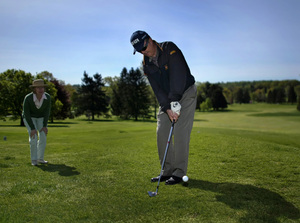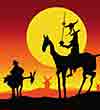His only handicap is on the course
Hooper one of top competitors in U.S. Blind Golf Association
"We call it the ultimate team sport," said Hooper, who just turned 60 years old. "You have to have a coach. She gives me all the information I need - alignment, the distance - to make a stroke.
"I'm still the one who has to make it, but I rely entirely on her. The more you trust your coach, the better player you are."
In that case, Judy might be the next Butch Harmon. Because on his level Bruce has been impersonating Tiger Woods. There are three competitive categories in the USBGA (all classifications are in best eye with best correction): totally blind and two vision-impaired divisions. Hooper is a "B-2," the middle group, which means he has the ability to recognize the shape of a hand up to visual acuity of 20/600.
"I still have trouble with depth perception," he said yesterday at Whitemarsh Valley Country Club. "I can't see the pin up there [about 20 yards away]. Someone has to step [the distance] off for me."
Someone must be doing something right, because Hooper has won two national USBGA championships. He won the international title last year in Japan. He's won the last eight tournaments he's entered.
"We've passed Tiger," he joked. "He only won seven in a row. We're setting our sights on Byron Nelson [who won 11 straight PGA Tour events in 1945]."
The San Antonio native was in town to promote this year's national championship, the 62nd, which will be held Sept. 25-26 at Edgmont C.C. in Delaware County. The same venue where, 40 years ago, Arnold Palmer and Bob Hope hosted an international BGA event, "Hope For The Blind."
(Bob Allman, a lawyer from Philadelphia, formed the USBGA in 1953 and became its first president.)
"We're very proud to say we're coming back," Hooper said.
These days, he does his best to spread the word. In 1998, when he was told what was happening to his eyes, he and his wife had no idea what the future held.
"We've talked about it a lot, but who would have ever thought we'd be doing this," Judy said. "When I found it, and looked into it some more, we saw where the next national championship was a month later in Fort Worth. He wanted to give it a try. They got him a coach, since I couldn't go. When he came home, that was it. He was hooked."
In time, so was she. And it is very much a partnership.
"I never played," she recalled. "Here's what I used to do: Go out to the course, take a good book, get an iced tea and sit in the cart. He'd drive around, hitting the ball. I'd just watch. No more.
"I had to learn. But we're in this together."
Hooper worked in the golf industry for 35 years, as a salesman for an equipment company. Yet contrary to the popular notion, he didn't tee it up every day. Or even enough to be very good at it.
"I used to be, when I was a kid," he admitted. "When you're in the business, I found out that guys who had my job could play all the time. But if they did, they weren't there very long. I played when I had to. It's a very difficult game, even when you can see."
Then Hooper's life, and Judy's, changed. Forever.
"I don't think we've ever actually had a real good diagnosis," he said. "I began noticing [a difference]. My mother, it's heredity. She's blind. Still, we're just not sure. The symptoms are exactly like macular degeneration, the loss of your central vision. Mine continues to deteriorate, from the inside out. I do have light sensitivity."
His professional career was over. He needed another focus. It just took awhile to find the right one.
"We tell the story of wanting to ignore the problem as you continue to work," Hooper said. "You become very angry. Finally, I had to accept what the problem was, and what it all meant. Now, I think we have a very good attitude.
"[Judy's] a terrific competitor. She gets mad at me [when I play poorly]. She's intense. She loves to win. That's what keeps me so positive . . . I could break 90 as a sighted golfer. Now, I think I'm actually better. I've changed my way of going about it. If I could see and use the techniques I'm using now, I'd probably be a really good golfer."
Sheila Drummond, the tournament director, was also at Whitemarsh yesterday. She lives in Lehighton, Pa., and at 52 is one of top women in the USBGA, even though she must also compete against the men. She's totally blind, having lost her sight a quarter-century ago due to the complications of diabetes. Hooper looks at her and sees the true essence of what this is about.
"What an inspirational person," he said. "She can't see a thing. Yet she lives every minute out there. And here I am, sitting at home saying, 'Oh, poor me. I can't see the ball any more.' People think golf is about watching the shot, but believe me, it isn't."
So he travels the world, doing his thing. The thing that keeps him, and the woman by his side, going. For as long, and as far, as their drive can take them.
"Before I lost my sight, I don't think many people cared about what I thought," Hooper said. "But great things have happened to me [since then] . . . I go out there, because I want to be better.
"People are fans, not because we're that good, but because we do something that is so challenging. It's not a perfect game. If we have a bad shot or two, we don't get too overwhelmed by it. As Sam Snead said, we have to play our foul balls. You have to be sure you can keep control of that."
As one. That's forever, too.
"I'm his eyes on the course," Judy said. "Magically, we lucked out. We found something we can devote our lives to. We went through a lot of things, trying to sort it all out. And, if we can help others with disabilities understand what it takes, that's something we're very passionate about."
Sure beats wondering what you're going to do with the rest of your tomorrows. *
For more information, visit http://www.blindgolf.com/. Or call 570-
386-5414. Volunteers are needed to be scorekeepers, caddies, rules officials and for general support.











